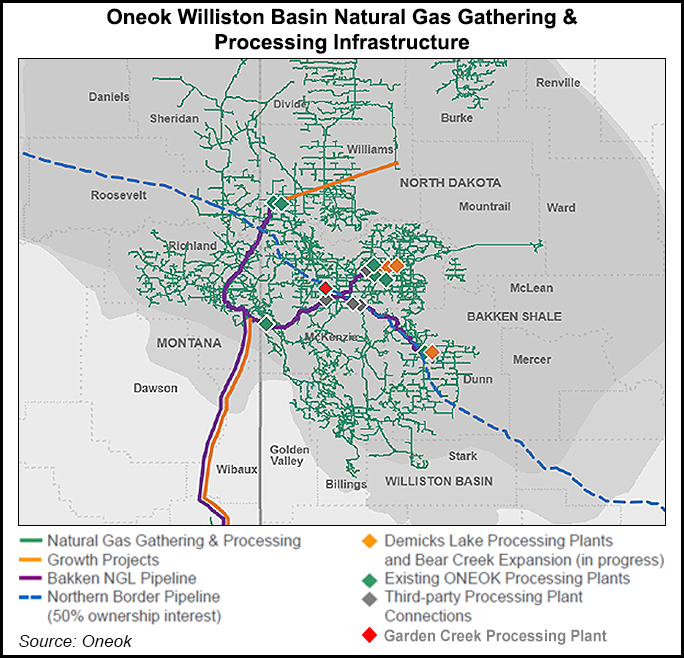Bakken Shale | NGI All News Access | Regulatory
Following Oneok Spill, North Dakota to Make Incident Reports More Transparent
The North Dakota Department of Environmental Quality (NDEQ) expects to roll out changes to how spill reports are conveyed to the public within a year’s time amid renewed public scrutiny.

The changes come with revived attention to a 2015 spill by Oneok Inc., which appeared to be underplayed in its initial reporting. In reality, it was only the initial incident report that included a smaller volume than what was recovered in the years following the incident, which is not unexpected, said NDEQ Director David Glatt.
Tulsa-based Oneok reported the spill in question at its Garden Creek gas processing facility near Watford City, ND. The July 2015 incident report iterated a spill of 10 gallons of natural gas condensate underneath the Garden Creek I Plant.
Last October, Oneok updated the incident report and told NDEQ that it had recovered 240,000 gallons of natural gas condensate. It also said cleanup efforts were ongoing.
“We submitted to the State of North Dakota our initial incident summary based on the limited information we had,” Oneok spokesperson Brad Borror told NGI’s Shale Daily. “After further investigation, we later learned the source of the release occurred from hairline cracks in the small, two-inch diameter below ground condensate piping at the facility.
“Due to the below ground nature of the release, it is impossible to determine the actual volume released with any level of certainty or accuracy,” he said.
The difference between the initial 10 gallon report and the updated report of 240,000 gallons first was reported earlier this month in a blog post by De Smog Blog, which cited an unnamed whistleblower.
Glatt said the state already had planned to change how incident information is made available to the public. The changes stem from the most recent legislative session, which concluded in April.
The changes would allow citizens to obtain an initial incident report online that would direct them to all of the subsequent follow-up reports and cleanup updates. The state already has this information and considers it public record, Glatt said.
NDEQ is also planning to institute a one-contact phone number for operators who need to report a spill or leak. That way, one report can instantly penetrate multiple state agencies and limit redundancies.
Both of these procedural changes could go into effect within the year, Glatt said.
From the operators’ standpoint, there will be little changes in how they report incidents to the state. If anything, the one-contact phone number would make it more efficient, said Glatt.
Oneok’s cleanup effort continues, but the Garden Creek plant’s processing capacity will remain unaffected, Borror said. “Short and long-term response actions have been ongoing and will continue.”
© 2024 Natural Gas Intelligence. All rights reserved.
ISSN © 2577-9877 | ISSN © 2158-8023 |
